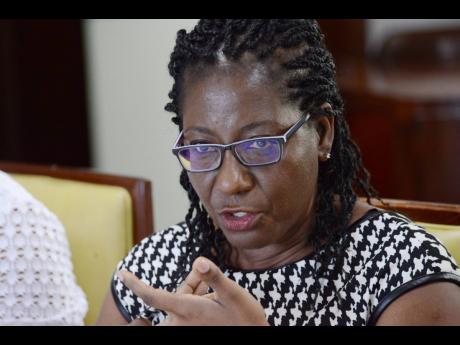Hold off on retirement for now, pension experts say
Workers planning to retire this year with a pension might want to reconsider and wait for a year or two, before they start pulling down on their retirement benefits, pension experts say.
The advice stems from the decline in the value of pension portfolio assets, which have dipped by double-digit levels since March, due to the fall in stock and bond prices.
The turmoil arose due to the onslaught of the COVID-19 pandemic reaching the local economy. Bond values have largely recovered, but not stocks.
Pending confirmation from the release of official data, the fall is considered steep enough to have erased nearly $100 billion in value from the $700 billion in portfolio assets held by private pensions up to December 2019.
“If you are planning to retire in 2020, your account has gone down under the defined-contribution plan,” said actuary and principal at Eckler Consultants Constance Hall at a Gleaner Editor’s Forum on prospects for the pension system.
Hall indicated that portfolios would have dipped between 10 and 15 per cent since March, when the first local COVID-19 case was detected, essentially ebbing some of the compounded growth in pension portfolio values over recent years.
“Those persons are likely to see their benefits lower than if they retired in 2019. Those that can hold on for a year or two, should hold on for a year or two and give the market time to settle,” Hall said.
Reduced benefits
Over the past five years, the pension industry’s portfolio size has grown at a compounded annual rate of 15.5 per cent, according to data from the regulator, the Financial Services Commission, FSC. Rushing to retire now and tapping into contributions affected by a depressed market would see retiree receiving reduced monthly benefits going forward.
“If you do not have to draw down now on your funds, then it is best to defer it and give it time to rebound. That is a tough decision, but the alternative is that you will lock in those losses,” said another forum participant, vice-president at Sagicor Group Jamaica and general manager in charge of the Employee Benefits Division, LaToya Mayhew-Kerr. As the top pension fund manager in Jamaica, Sagicor says it manages around 60 per cent of private pension funds.
On the investment side, pension fund managers have shifted new monies away from investing in higher-risk asset classes, said Candace Villers, assistant asset manager at Sagicor Group Jamaica.
“The main strategy at this time is a conservative one,” Villers told the Editor’s Forum. “Instead of channelling new monies into high risk areas such as equities, we consider going into more conservative asset classes like bond investments.”
Retired workers will typically receive about 20 per cent of their monthly pay as pension provided they save for about three decades, said Conroy Rose, CEO, Victoria Mutual Pensions Management Limited, speaking with the Financial Gleaner after the forum, in which he was a participant. He added that the amount would be greater depending on the growth in the asset value of the pension fund.
Rose stated that under the defined-benefit plan, the amount is set, so there is less variability in benefits.
“So, theoretically, the defined-contribution plan would benefit more from a growth in assets. Companies are moving away from defined benefits because any shortfall in the guaranteed benefit would have to be covered by the sponsor, so they do not want that burden,” he added.
Additionally, retirees who contributed to the public pension scheme, the National Insurance Scheme, or NIS, during their working life would receive a monthly payout of about $13,600.
“But this is just one egg in the basket,” said Rose at the forum, while arguing that persons should have other forms of investment to augment their pension.
He sees the current health crisis as the opportunity for a big reset to get the average Jamaican into the mindset of saving.
“I think the opportune time is now – the big event is COVID-19. The first thing on individuals’ minds now is to think of their future,” he said.
At December 2019, private pension coverage hovered at 10.1 per cent of the employed labour force, according to data from the FSC. Additionally, 38.5 per cent of the employed labour force actively contributes to NIS.
The FSC indicates that the long-term, negative impact of the virus might lead to a number of pension plans winding up in circumstances where employers are forced by changing market conditions to lock down failing businesses.
Sponsors of pension plans may also look to take contribution holidays, where their plan rules permit, which will further lessen the accumulation of benefits for participating employees, the FSC said.
Pension experts say, however, that for now employers are meeting their obligations and paying workers’ contributions, even within one of the worst-hit sectors, the hotel industry.
It took one year for pension funds under management to climb from $600 billion to $700 billion. The final numbers are yet to be tabulated but, already, the fear is that the pandemic may have erased that gain in less than five months.
Some 37 per cent of funds under management are invested in unit trust-type, pooled investment arrangements. Separately, direct holdings in stocks amounts to 26 per cent, Government of Jamaica securities account for 20 per cent, and real estate 4.0 per cent, according to FSC data.
Of the estimated 1.27 million employed workforce, there were nearly 127,350 members contributing to 809 private pension plans in December 2019, up from 118,000 members a year earlier who were contributing to 807 plans.
Importantly, of the over 800 plans, only about 380 were active, according to the FSC.

